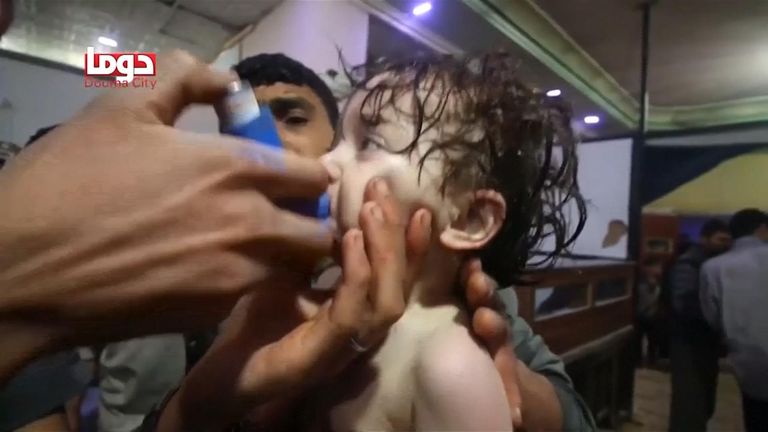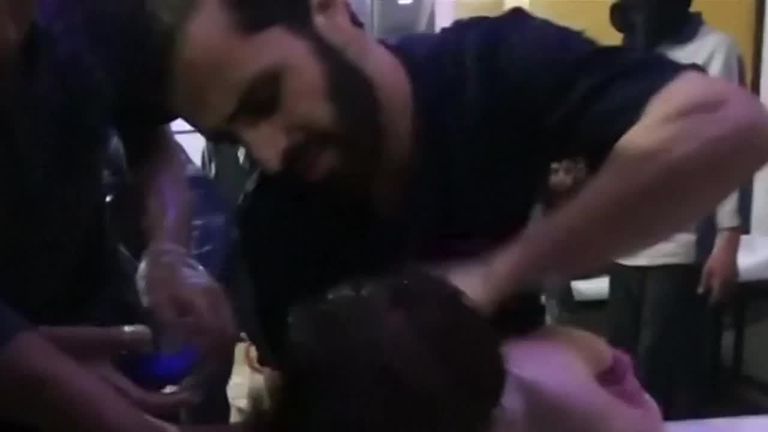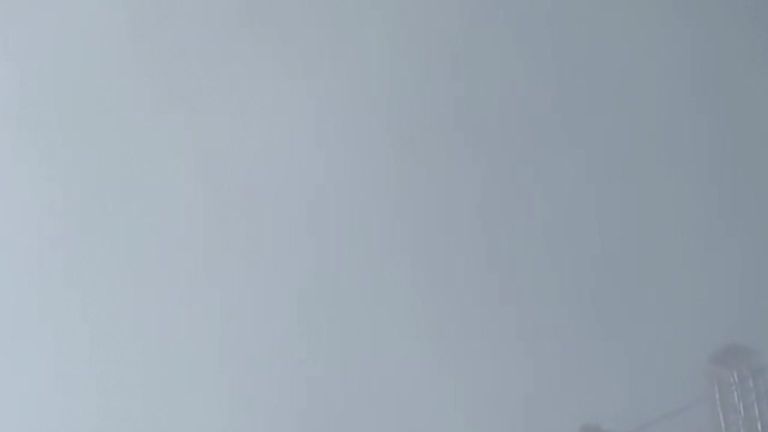Syrian opposition and Russia reach agreement over Douma
The deal follows an alleged chemical attack in the city by the Syrian government, with claims of up to 70 deaths.
Sunday 8 April 2018 21:53, UK
Opposition forces have reached a deal with Russia that will see the evacuation of rebel fighters from their last bastion near Damascus.
The potential ceasefire in Douma follows an alleged chemical weapons attack on the rebel-held enclave by Syrian government forces, which are backed by Russia.
Rebels from the Jaish al Islam group are to be evacuated from the area to northern Syria, in return for the release of hundreds of hostages and prisoners of war.
The first batch of hostages is now thought to have been released, while a bus carrying some rebels has left the enclave.
Local authorities and Russian military police will enter the city under the deal, negotiators said.
They added that fighters who stay will not be pursued by authorities if they make peace with the regime and that conscription to the national military will not be imposed for six months.
:: Trump warns countries backing 'animal' Syrian leader Bashar al Assad
Opposition sources said at least 70 people were killed by the alleged chemical attack late on Saturday, with more than 500 civilians reported injured.
Volunteer rescue service The White Helmets, which also has links to anti-Assad forces, said many of the victims of the alleged attack were women and children. The group published graphic images appearing to show dead children who had been frothing at the mouth.
The Syrian American Medical Society also described patients foaming at the mouth, saying victims suffered corneal burns and smelled of a "chlorine-like odour". One woman had convulsions and pinpoint pupils, the society said.
"The reported symptoms indicate that the victims suffocated from the exposure to toxic chemicals, most likely an organophosphate element," it said.
The medical relief group also claimed an "explosive barrel" attack on Douma hospital and its surrounding area had prevented ambulances from reaching victims.
There has been no independent verification of the allegations of a chlorine gas attack, and they have been denied by the Syrian government and Russia.
An offensive that began in February has seen the Syrian government recapture nearly all of eastern Ghouta from rebels, leaving just Douma in the hands of insurgent group Jaish al Islam.
The area has been dubbed "hell on earth" and subjected to relentless military force, with 1,600 civilians and tens of thousands more displaced according to the Syrian Observatory for Human Rights.
Thousands of fighters from another group, Failaq al Rahman, finished pulling out of areas of eastern Ghouta along with tens of thousands of civilians last week, after reaching a deal with the government.
Saturday's alleged attack was widely condemned by international observers, with Britain and the US calling for an "immediate response by the international community" if the claims are proven.
The United Nations Security Council is likely to meet on Monday to discuss the incident, following a request by the United States, Britain, France, Peru and others.
Russia has also called for a Monday meeting of the Council, citing "international threats to peace and security".
The US State Department said it would use "all efforts available" to hold "those who use chemical weapons" to account, in a statement that referenced the deadly sarin gas attack by the Assad regime on the town of Khan Sheikhoun in April 2017.
"Russia, with its unwavering support for the regime, ultimately bears responsibility for these brutal attacks, targeting of countless civilians, and the suffocation of Syria's most vulnerable communities with chemical weapons," it added.
The Foreign Office said the reports, if proven, showed "Assad's brutality against innocent civilians" and disregard for international norms.
Evidence for past chemical weapons use by the Syrian government has been widely documented, with a joint inquiry by the UN and the Organisation for the Prohibition of Chemical Weapons finding it responsible for the Khan Sheikhoun sarin attack.
The inquiry had previously found that Syrian government forces were responsible for three chlorine gas attacks in 2014 and 2015, and that Islamic State militants had used mustard gas.









